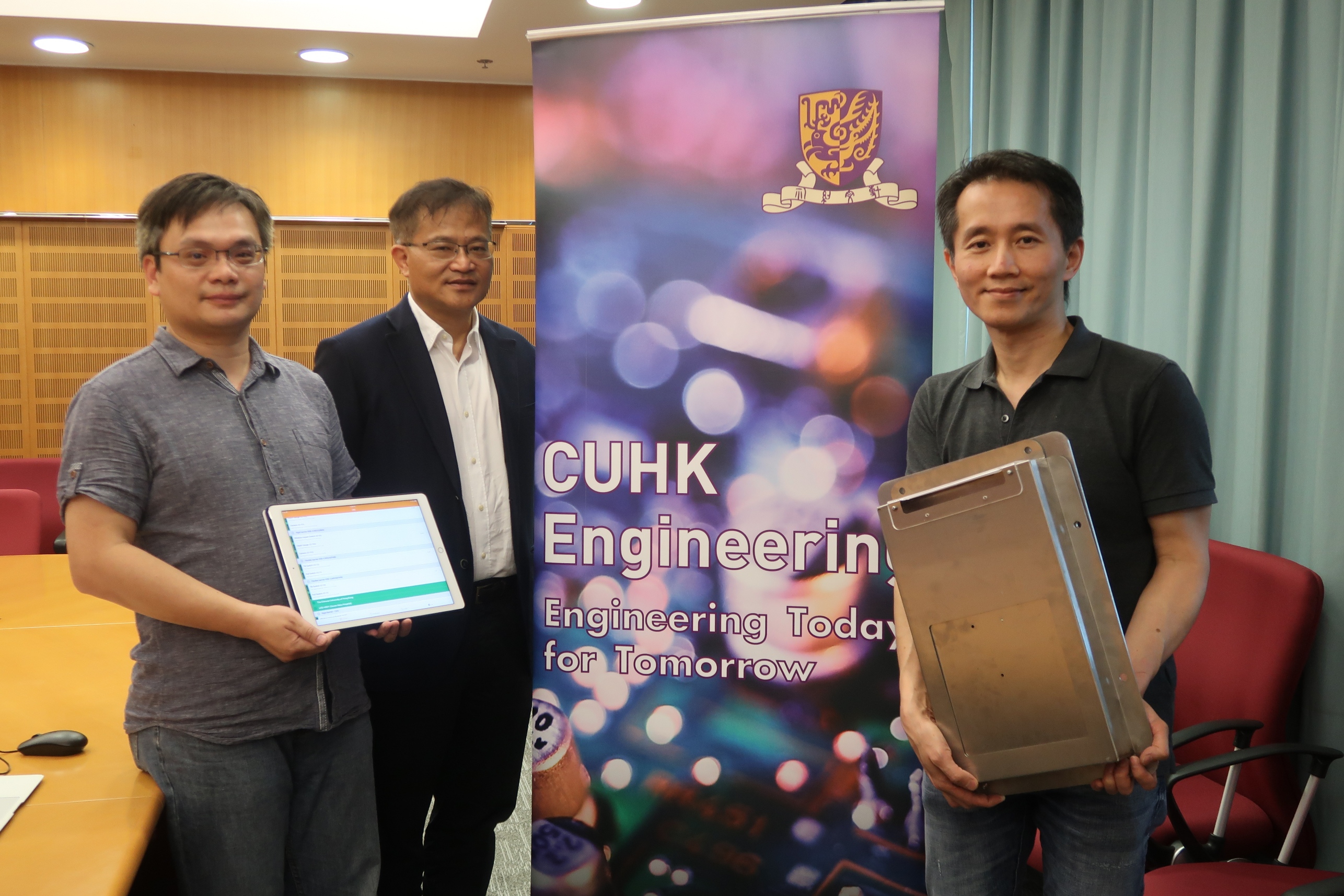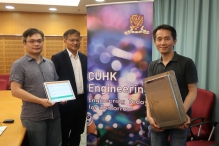CUHK
News Centre
Smart Hong Kong City Development SeriesCUHK Faculty of Engineering Develops Landslide Detection SystemBoosting Slope Safety for Hong Kong
A smart landslide detection system developed by a research team led by Professor Cheng Chun-hung, Associate Professor of the Department of Systems Engineering and Engineering Management at The Chinese University of Hong Kong (CUHK), was recognised as one of the latest application-oriented researches that ‘save citizens’ lives’ and has recently won a silver award under the category of Smart Living (Smart Home) of the HKICT Awards 2018.
Mountainous terrain covers 60% of the land area of Hong Kong, and landslides may happen under conditions of continuous rainfall. If early signs of debris flow are not detected, it might cause casualties and losses. Professor Cheng Chun-hung and his team have successfully developed a smart landslide detection system to monitor real-time terrain conditions and transmit wireless data to the mobile devices of duty staff, using low-cost and low-energy sensing devices. Last year, in collaboration with the Geotechnical Engineering Office under the Civil Engineering and Development Department (CEDD), CUHK conducted experiments in Sham Tseng where landslides had occurred. The system performed steadily under bad weather conditions during the experiment, demonstrating its ability to immediately notice any landslide activity on hillside near residential areas.
CEDD has implemented risk mitigation works for 30 natural hillside catchments per year since 2010, and thus far there have been over 200 debris-resisting barriers well built in the forms of rigid concrete barriers and flexible wire-mesh fence barriers. However, the diverse and remote locations of the different barriers and the variations in weather conditions impose practical difficulties for performing onsite checks for any accumulation of debris from natural landscape erosion.
In view of this, CEDD joined hands with CUHK Department of Systems Engineering and Engineering Management to design a landslide detection system mounted on debris-resistant barriers to monitor and give notice of any landslide activity. The system was piloted on the hillsides of Sham Tseng in November 2016. The pilot system, with sensing devices and system components, has been installed on 4 out of 19 debris-resistant barriers there. The sensing devices are designed to detect any impact when landslide debris hits the barrier wall, measure the debris accumulation level inside the barrier, and detect any inclination of the wire-mesh fence. In addition, there are infrared night vision cameras to provide a 24-hour visual context for landslide situation assessment. The authorities concerned can then be alerted at all times to any landslide activities in remote hillsides via the Landslide Detection System (LDS) mobile app in both iOS and Android platforms. Most importantly, it helps proactively provide timely data, especially under extreme weather conditions, to assess any landslide situation close to residential areas.
The hilly terrain and large spacing have made generating the power supply and communicating with wireless networks the two biggest challenges to developing the landslide detection system. On one hand, the team adopts low-voltage sensors, camera electronic components, and low-power consumption electronic components that are commonly available, low-cost and energy-efficient. The battery supply for the system can last for three years, which, in turn, saves much maintenance and consumption cost. On the other hand, the team wisely explores the use of solar panels for a steady electricity storage and supply. Under normal circumstances, the system can continuously operate for 15 days, with sufficient solar supply.
Regarding the dispersed locations of barriers and other connection problem of the smarts system, the team turns to LoRa which is a reliable and low-energy wireless technology. The wireless communication has proved successful in transmitting complete data back to the base station in extreme weather conditions and hilly environments. The data received can also be sent via mobile to staff on duty.
Dr. Dorbin Ng says that the landslide detection system is not only flexible for deployment, but also very reasonable in terms of cost and energy consumption level. The communication and sensing performance during the typhoon signal number 8, or higher, remains satisfactory. The pilot scope has recently been extended to the hillside at Queen Mary Hospital in Island South. He hopes that the pilot system at the new barrier built on the hillside behind the hospital can provide more data for future large-scale deployment.
CUHK Engineering Series: Smart Hong Kong City Development
CUHK is one of the pioneers in the research on artificial intelligence (AI) and deep learning. It has already received top awards in international challenges for face recognition and visual recognition. The CUHK Multimedia Laboratory was named as one of the pioneers in AI research. It is the only institution in Asia to receive this recognition, alongside the University of California, Berkeley, Massachusetts Institute of Technology, Stanford University and the University of Oxford. Different research teams in the Departments of Information Engineering, Electronic Engineering, Systems Engineering and Engineering Management, and Computer Science and Engineering at the Faculty of Engineering are also dedicated to the application of AI and deep learning in various areas, such as smart living, smart mobility and smart environment, in order to build Hong Kong into a world class smart city. In the future, the Faculty will launch more innovative projects that make use of AI to improve the quality of human life and share it with the public through the ‘Smart Hong Kong City Development’ Series.



